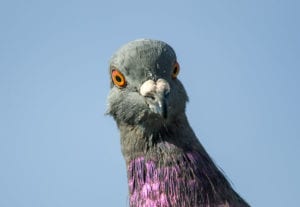On Wednesday the Federal Veterinary and Phytosanitary Inspection Service reported that the birds’ abnormal behavior was caused by the so-called “Newcastle disease,” which can spread to humans.
Moscow’s Veterinary Committee said the mass death of pigeons in the capital was due to salmonellа poisoning, an intestinal infection spread among animals and humans. Veterinary specialists detected lesions on the gastrointestinal tracts and livers of the dead birds caused by salmonella, not Newcastle disease, Interfax reported.
Autopsies of dead birds showed that they had all suffered from a common intestinal infection that is not dangerous to humans, said Moscow’s deputy mayor for social issues, Leonid Pechatnikov. Neither the bird flu, dangerous to humans, nor fowl plague or any other diseases threatening people have been found, he said.
Gennady Onishchenko, Russia’s chief sanitary inspector, said that while the word “pigeon epidemic” was often used in the press, he doubted it could described as one. However, he warned that parents should take care if their children could come into contact with sick birds.

“We are especially worried about children’s playgrounds… And if a dead bird is found on the balcony, it must be washed with disinfectant. Doing this, one must be wearing rubber gloves,” Onishchenko said.
Although the birds’ salmonella is not harmful to humans, direct contact with the sick birds should be avoided, veterinarians said.
“The disease poses no risk for humans, provided standard precautions of personal hygiene are observed and direct contact with sick birds is avoided. Activators of avian influenza and psittacosis (an infection that can be transmitted to humans) have not been identified,” the committee said.
Salmonella infections in humans usually resolve in 5-7 days, but a small number of persons with Salmonella develop pain in their joints, irritation of the eyes and painful urination. The so-called Reiter’s syndrome can last for months or years, and can lead to chronic arthritis.
Newcastle disease, which is transmissible to humans, can cause mild conjunctivitis and influenza-like symptoms.
Ornithologists say that the so-called “epidemic” occurs every year, and not only in Moscow. “Most often, it begins in August. This is due to the fact that the breeding season is over, young birds come out with reduced immunity, and they are more susceptible to all infectious diseases,” ornithologist Natalia Anisimova told Russia’s TV Dozhd (Rain).
At Pigeon Patrol, we manufacture and offer a variety of bird deterrents, ranging from Ultra-flex Bird Spikes with UV protection, Bird Netting, 4-S Gel and the best Ultrasonic and audible sound devices on the market today.
Contact us at 1- 877– 4– NO-BIRD, (604) 585-9279 or visit our website at www.pigeonpatrol.ca
Bird Gone, Pigeon Gone, Seagull Gone, Pigeon issue, pigeon spikes, 1-877-4NO-BIRD, 4-S Gel, Bird Control, Pigeon Control, bird repellent, Bird Spikes, sonic bird repellent, stainless steel bird spikes, bird spikes Vancouver, Ultra Sonic Bird Control, Bird Netting, Plastic Bird Spikes, Canada bird spike deterrents, Pigeon Pests, B Gone Pigeon, Pigeon Patrol, pest controller, pest control operator, pest control technician, Pigeon Control Products, humane pigeon spikes, pigeon deterrents, pigeon traps, Pigeon repellents, Sound & Laser Deterrents, wildlife control, raccoon, skunk, squirrel deterrent, De-Fence Spikes, Dragons Den, Canada bird spikes, Canada pigeon, pigeon control, pigeon patrol, pigeon. Kill pigeons, crow, starling
